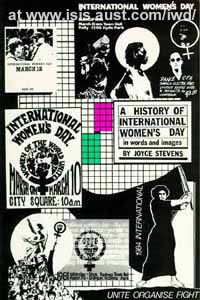

![]() WLOE E-Newsletter March 8, 2004: International Women's Day
Special
WLOE E-Newsletter March 8, 2004: International Women's Day
Special
A
History of International Women's Day in words and images
is the
name of work by the Australian activist-writer Joyce
Stevens. This lovingly done isis-australia
website (est. 1996) presents an international
and Australian view of the holiday, its origins and meaning.

http://www.isis.aust.com/iwd/stevens/contents.htm
Origins (from the site)
"Born at a time of great
social turbulence and crisis, IWD inherited a tradition of protest and political
activism. In the years before 1910, from the turn of the 20th century, women
in industrially developing countries were entering paid work in some numbers.
Their jobs were sex segregated, mainly in textiles, manufacturing and domestic
services where conditions were wretched and wages worse than depressed. Trade
unions were developing and industrial disputes broke out, including among sections
of non-unionised women workers. In Europe, the flames of revolution were being
kindled. Many of the changes taking place in women's lives pushed against the
political restrictions surrounding them..."
http://www.isis.aust.com/iwd/stevens/origins.htm
Information from the United
Nations on international Women's Day:
http://www.un.org/ecosocdev/geninfo/women/womday97.htm
Feminist Peace Network
"International
Women's Day Global Peace Vigil For the last three years, The Feminist Peace
Network has asked women around the world to participate in an International
Women's Day Global Peace vigil. Once again, we invite you to join with women
everywhere in taking a stand for peace and an end to the global pandemic of
violence against women. Women in more than 100 communities in countries all
over the world have participated in this event. The number of participants is
expected to continue to grow as women join hands across the world to say no
to the domination of violence and yes to peaceful partnership." More information
on the history of IWD can be found at International Women's Day.
http://feministpeacenetwork.org/iwd.htm
Code Pink
" For 93 years,
women around the world have been marking International Women's Day with calls
for a more peace and justice-centered world. CODEPINK invites you to join this
rich tradition by converging with women across the U.S. on the week-end of March
6-8. Wear pink, bring signs, puppets, and other creative props, and be prepared
to "pink slip" the U.S. policymakers and corporate bosses who are endangering
our environment and people all over the world!"
http://www.codepinkalert.org/National_Actions_March_8.shtml
"International Women's
Day is now celebrated on March 8 annually throughout the world. The historical
origins of International Women's Day show us how wage-earning women were emerging
as a political force in the early years of the twentieth century. Beginning
in the United States as a day to honor the political rights of working women,
"Woman's Day" celebrations were immediately successful in the United States
and in Europe. Because this holiday continues to articulate women's issues in
new ways, it deserves to be celebrated even more emphatically today, both within
the United States and around the world.
Partly due to the lack of authoritative historical information, myths have grown
up to explain the origins of International Women's Day (IWD). Historian Temma
Kaplan has examined these myths, one of which holds that International Women's
Day began in 1907 as a memorial to an 1857 protest of women garment workers
in New York City against "low wages, the twelve-hour workday, and increasing
work loads, [that] was dispersed by the police, rather brutally."[1] Kaplan
found no evidence to support this account of the Day's origins."
http://womhist.binghamton.edu/iwd/intro.htm
On Clara Zetkin:
"Clara Eissner
was born in Wiederau, Saxony on July 5, 1857. While studying at Leipzig Teacher's
College for Women she became a socialist and feminist. In 1881 Zetkin joined
the Social Democrat Party. A strong supporter international socialism, she married
the Marxist, Ossip Zetkin, a Russian revolutionary living in exile. The couple
had two children before Ossip died of tuberculosis in January, in 1889. Zetkin
continued to play an active role in the Social Democrat Party and in 1891 became
editor of the party's journal, Die Gleichheit (Equality). An impressive journalist,
Zetkin took the circulation from 11,000 in 1903 to 67,000 in 1906. A strong
campaigner for women's suffrage, Zetkin was appointed secretary of the International
Socialist Women in 1910. In 1911 Zetkin joined with Rosa Luxemburg in attacking
the leadership of the SPD Congress at Jena. The two women objected to what they
believed was a lack of commitment against German imperialism..."
http://www.marxists.org/archive/zetkin/
From Australia:
"Around the
world on this year’s International Women’s Day women and supporters will gather
to recognise the struggle for women’s equality and justice: in the workplace,
in the home and throughout society. This year’s International Women’s Day takes
place at a time when women around the world remain on the front lines of wars
on their liberties and livelihoods..."
http://www.scoop.co.nz/mason/stories/PO0403/S00036.htm
Looking back: From 2002
In
a March 2002 e-newsletter we reported about an event taking place on this day
in Kensington, California (USA), where women were invited to: "Celebrate
International Women's Day by helping artist Emily Duffy add the final layers
of bras to the BraBall sculpture." The story of how this project grew into
a massive (7,000 bras!) art action and more, see:
http://www.braball.com
Wishing you all a good,
strong but peaceful International Women's Day!